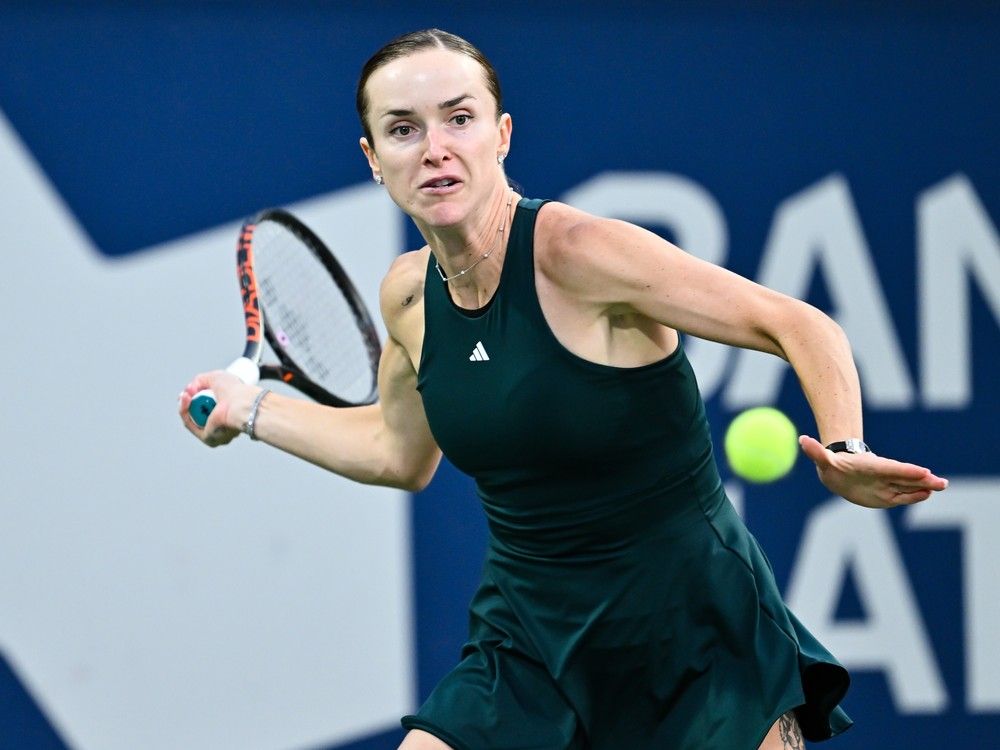
It’s become routine for women tennis players to face online abuse after they lose a professional matchup. Canada’s premiere tennis tournament, the National Bank Open, has been no exception.
While Canada’s new star, 18-year-old Victoria Mboko, has been receiving plaudits for her meteoric rise at the tournament – as she readies herself to play in tonight’s women’s final – other players have not been so lucky.
Ukrainian Elina Svitolina was the target of online vitriol after losing in the quarterfinals. The messages have included death threats and celebrations of Russia killing her compatriots. Racial slurs have also been directed at her husband, French tennis player Gael Monfils, who is Black.
Svitolina has hit back with her own messages: “To all the bettors: I’m a mum before I’m an athlete. The way you talk to women — to mothers — is SHAMEFUL. If your mothers saw your messages, they’d be disgusted.”
Elina Svitolina showed the abusive & horrific messages she received from bettors after her loss to Naomi Osaka in Montreal.
— The Tennis Letter (@TheTennisLetter) August 6, 2025
Her response to them:
“To all the bettors: I'm a mom before I'm an athlete. The way you talk to women - to mothers - is SHAMEFUL. If your moms saw your… pic.twitter.com/nG7jA87Bw3
American tennis player Coco Gauff , who lost to Mboko in the quarter finals, told the Associated Press that threats are not uncommon. “After I lost, I got like murder threats, I got told they were going to find my mom and stuff,” she said in Montreal. “I used to take it really to heart when I was younger. But now, not as much.”
Gauff insists social media platforms could do “a lot better” to filter out the hate. “TikTok does a great job of blocking, deleting people and deleting pages as soon as something hurtful is commented, (but) I don’t think Instagram and X do the same with their requirements,” she said.
American Taylor Townsend , who finished runner-up in women’s doubles with Chinese partner Zhang Shuai, says online abuse is not new.
“It sucks, but it’s also part of the world that we live in,” she said. “And … there are a lot of people who don’t and who are just hiding behind screens … it’s a part of just being a public figure and being front-facing and playing a sport.”
Earlier this year, British tennis player Katie Boulter revealed that she had been receiving death threats during the French Open. They targeted her and her family.
Boulter told the BBC she thought many of the messages were sent by people who are placing bets on tennis matches.
“Hope you get cancer,” said one message.
Another – laced with expletives – referenced damaging her “grandmother’s grave if she’s not dead by tomorrow” and “candles and a coffin for your entire family”.
A third said: “Go to hell, I lost money my mother sent me.”
Boulter’s public comments coincided with the Women’s Tennis Association and International Tennis Federation publishing a re port into online abuse , showing that 458 tennis players were targeted by more than 8,000 abusive comments and posts on social media in 2024.
The report’s findings, drawn from data provided by the Signify Group’s threat matrix service, showed that “angry gamblers” sent 40 per cent of the abuse. Of that, a subset of 10 accounts was responsible for 12 per cent of abuse.
REPORT: Five WTA players alone receive more than a quarter of all online threats, with 40% of abuse coming from online gamblers 😳
— TENNIS (@Tennis) June 18, 2025
Read more of the shocking details below. https://t.co/wmLHjedeHl
Signify operates across all the major social media platforms in over 40 languages. It says all players competing in WTA and ITF world tour events are covered by the service.
“This unique dataset, covering all players across international tennis tours and Grand Slams, illustrates that a relatively small number of accounts are responsible for a significant proportion of prolific abuse and trolling,” Jonathan Hirshler, Signify CEO, told British sports-betting news site, sbcnews.co.uk .
In the wake of the report’s release, the WTA and ITF called on the betting industry to act.
Meanwhile, Signify took action against the most serious and prolific accounts. Concern about 15 accounts were escalated to law enforcement agencies. Three of them were submitted to the FBI and 12 to other national law enforcement bodies. Account details were also shared with security teams connected with major tennis events to prevent individuals from gaining access to venues.
In 2024, Sportradar, a firm which works closely with many betting operators, got involved in tennis’ athlete protection initiatives, working with the Association of Tennis Professionals tour.
The firm launched Safe Sport, a service now used to address online abuse targeting professional athletes. It utilizes artificial intelligence moderation, education and investigation. It has been made available to the top 250 ATP singles players and the top 50-ranked doubles players on a free, opt-in basis.
Our website is the place for the latest breaking news, exclusive scoops, longreads and provocative commentary. Please bookmark nationalpost.com and sign up for our daily newsletter, Posted, here.